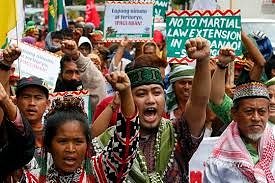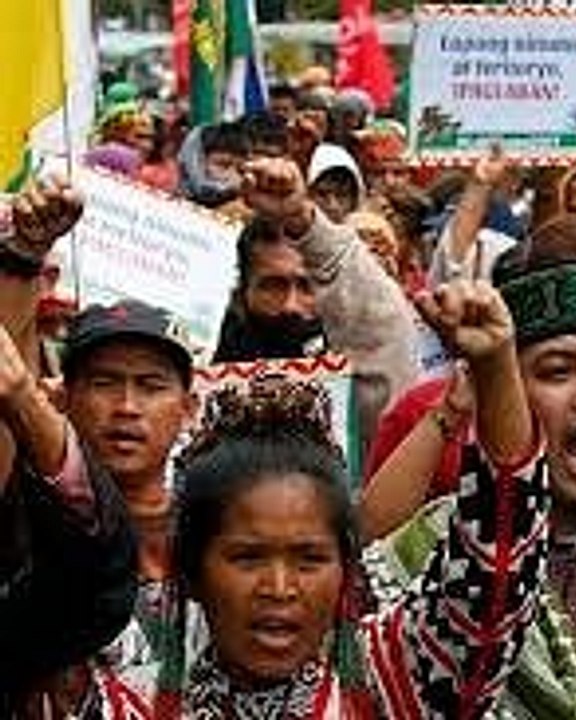Law and Politics
Letter to the Neighborhood Board of Directors

Possible Martial Law in the Philippines
This was written when I was in the Army Reserve, Chief Warrant Officer, MI Branch, working as an analyst for the Pacific Command's Joint Intelligence Center. It is the unclassified version of a briefing based on open source material in which I properly predicted that the Philippines government would use a political incident as an excuse to declare martial law.
JICPAC JOINT INTELLIGENCE BULLETIN
EXECUTIVE SUMMARY: A recent string of successful NPA (New People’s Army) attacks against government facilities indicate the possibility of collusion by members of the Armed Forces of the Philippines (AFP) with the NPA, and of possible infiltration of the AFP by the NPA. Official sources even consider the possibility these forces may intend to attempt a coup.
On Jan 15, twenty NPA guerrillas, reportedly wearing military uniforms and driving several vehicles, one with government plates, raided the provincial jail in Batanga City on Fort Bonafacio. They raised their rifles and shouted, "who are the NPA here." They freed four officers held in the 2003 Oakwood mutiny. No shots were fired.
On Jan 6 NPA rebels took over the police station at Albuera, Leyte, taking a large cache of arms and documents, also without firing a shot.
In late December a Marine Captain and ringleader of the Oakwood mutiny escaped captivity. The NPA claimed at the time he was but one of many officers allied with the Communists. "Their tribe is fast increasing...They will soon take the fight to the open in alliance with progressive and revolutionary forces."
A shadowy group called the Young Officers Union New Generation (YOUNG) claimed to help with the jailbreak at Batanga. In connection with this, two officers and two soldiers were relieved of duties pending investigation. Meanwhile, President Arroyo angrily demanded to know "who the traitors in the military are."
The escaped Oakwood mutineers, the so-called Magdalo 4, issued a statement that they have bolted from "the repression of a bogus regime...We seek the change of a system that installs the people's enemies in power and perpetuates the exclusion of the majority." In response the NPA invited them to discuss "joint or cooperative military projects." Norberto Gonzales, Arroyo's National Security Advisor, was reportedly investigating whether the four officers had defected to the NPA and believed they may be plotting an assassination against the President. Arroyo called off a trip to three provinces south of Manilla just in case. Of course, based on the circumstances of their release, one cannot dismiss the possibility that the Magdalo 4 weren't already NPA before their release.
According to AFP Chief of Staff General Generoso Senga and other officials, the prison escape may have been part of a larger plot to instigate a popular uprising culminating in a coup. On Jan 21 security forces set up checkpoints in key roads in the capital and barricades in front of the Presidential palace. Senga felt compelled to deny rumors he had resigned, rumors he believed were instigated by the coup plotters. Incoming Presidential Chief of Staff Michael Defensor warned coup plotters that the government would fight "fire with fire."
However, the strong possibility must be considered that the government may be intentionally exaggerating the danger of this incident in order to create conditions that would allow them to declare a state of emergency. Such a declaration was seriously considered recently during the height of the impeachment crisis.
JICPAC ASSESSMENT
That the prison escape and defection of four low-level officers could be prelude to the downfall of the Philippine government appears unlikely. However, it does seem to indicate the likelihood of growing leftwing sympathy within, and even NPA infiltration of, the AFP. If this trend continues, long term it could reduce the effectiveness of the military, and even threaten the stability of an already shaky government.







My neighborhood Board tried to claim that a ballot initiative had passed, when in fact, it did not. They clearly did not understand the legal issue. This letter explained the Deed restrictions and By-Laws in a clear way that a layman could understand. Eventually they recognized their error and backed down.
Dear neighbors,
Let me start by thanking you for your service at this very difficult time. I know you are under great pressure.
At the December 11 meeting it was announced that the initiative to increase the assessment cap passed by a vote of 233-206. Not having a copy of the ballot or the Deed Restrictions and By-Laws with me, I took the word of the board members that this vote constituted a legal change in the governing documents.
I did express doubts at the time, but due to busyness and work obligations I delayed re-studying the Deed Restrictions and By-Laws, but when I did, I found this one, clear unmistakable provision: “In no case shall the annual maintenance assessment be greater that ten dollars per acre in any year unless agreed to by an affirmative vote of fifty-one percent of the ENTIRE MEMBERSHIP.” This was stated on the recent ballot and on the previous ballot initiative and was clearly the legal basis of the vote and the understanding of this rule was the basis for why people chose to vote, or sometimes, chose not to vote. Because under these rules a non-vote IS a no vote.
Two hundred and thirty-three votes are not 51% of the 502 votes of the entire membership. The measure failed and this needs to be communicated to the community ASAP.
According to Andrea, the rest of the Board is arguing that the measure passed on the basis of Article Eleven 1 of the By-Laws which states:
These By-laws may be amended, altered, or modified by addition or deletion by an affirmative vote of not less than a majority of the voters present in person or by proxy at the annual membership meeting, provided that due notice of such changes in detail is provided to the entire membership at least forty-five days prior to the scheduled annual meeting.
This cannot be the basis for saying the community passed the initiative for the following reasons:
I want to work constructively with the board to address the pressing needs of the community. It is true that I believed that the proposal was excessive in its scope, but clearly the board does need the ability to raise more funds, and the lake needs to be repaired, hopefully in the most cost-effective way possible, and funded in an equitable manner.
But trying to raise assessments without the proper legal foundation will divide the neighborhood, possibly beyond repair. I hope that doesn’t happen, but I fear it will. To avoid that is why I am writing this to you. People are not obliged to pay assessments that are illegal. And many won’t. Raising the assessments in this manner will cost more money than it will raise.
Regardless of how necessary the proposed changes seem to be to those who support them, or how unfair the method of amendment may seem, the changes must be made according to the rules we all agreed upon. If the Board itself, which is the instrument for enforcing those rules, becomes lawless and is perceived as oppressive, then why should anyone else abide by the rules?
Better to go back to the drawing board and find a solution that 51% of the neighborhood can support.
One more issue. The last Board meeting was unofficial. The By-Laws clearly state that a meeting requires the attendance of the President (or Vice President), and also that a quorum of four Board members is required for an official meeting.
Maybe less weighty business can be conducted without a quorum, but to announce that an initiative to raise the assessment cap passed, when by all appearances it didn’t, and then to raise assessments on the basis of that, well, I think an official meeting is required.
Please respond. If I have missed something let me know.
Sincerely,
Bill Metzger